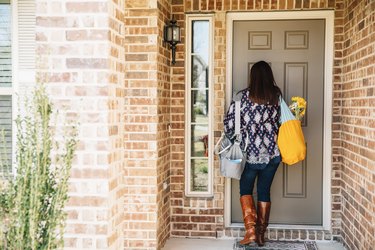
The novel coronavirus is still circulating, and while multiple vaccines are available, not everyone has had a chance to get their shot yet.
If you aren't yet fully vaccinated, the Centers for Disease Control and Prevention (CDC) recommends following a trio of preventative practices: wearing a mask, washing your hands and staying at least six feet from others whenever possible.
Video of the Day
Video of the Day
And that same advice may apply if you're vaccinated but are immunocompromised: If you're taking medication or have a condition that weakens your immune system, you may not be fully protected, per the CDC. (Talk to your doctor about your personal level of risk.)
That said, as businesses reopen and the world reverts to a sort of post-vaccination normalcy, odds are you can't avoid stepping outside altogether. So, if you need to be extra careful to avoid contact with the coronavirus, what can you do to keep safe when you venture beyond your front door?
Here, health experts offer tips to help you stay healthy and avoid putting others at risk.
Get tips on how to stay healthy, safe and sane during the novel coronavirus pandemic.
1. Determine Whether Leaving Home Is Essential
Before you set foot outside, be sure the trip is absolutely necessary, says Eudene Harry, MD, a board-certified emergency medicine and holistic integrative medicine physician and medical director for Oasis Wellness and Rejuvenation Center.
Ask yourself whether you can manage the task from home or delay it until a later date, she says. "For example, do you need to go to the office or can you telework? Is this a recreational activity that can be postponed? Will it create more potential exposure?"
If the outing isn't of the essence or may put you at unnecessary risk, it's better to stay in, even as businesses begin to open their doors. For people who are unvaccinated, the CDC advises avoiding crowded and indoor spots (think: restaurants, gyms and movie theaters).
Outdoor activities, such as biking or having a picnic with vaccinated companions, are less risky, according to the CDC — but not all outdoor activities are low-risk. The CDC ranks going to crowded outdoor spaces as "least safe" for people who are unvaccinated.
Of course, if you are fully vaccinated, the CDC considers most activities — both indoor and outdoor — safe to do.
2. Be Prepared

When you leave the safety of home, "planning is number one," says Jason Kindrachuk, PhD, a virologist at the University of Manitoba in Canada. Consider: How can you minimize your time in completing your tasks? How can you avoid close contact with others or large groups?
Though you may not be able to completely evade interactions with others, try to time your trips during nonpeak hours when fewer people are out and about.
And always pack hand sanitizer, disinfectant wipes and tissues (in case you inadvertently sneeze — after all, it is still allergy season), Dr. Harry adds.
Equally important, she recommends adopting the mindset, "I must not touch my face." Make it your mantra.
Remember: Many pathogens — including the novel coronavirus — get into our bodies through our eyes, nose and mouth, so keeping your fingers away from these points of entry is paramount.
3. Take a Breath
If this pandemic is producing feelings of panic, you're not alone. "This is an anxiety-provoking time for many," says Jennie Marie Battistin, LMFT, a California-based licensed marriage family therapist and founding director of Hope Therapy Center.
And stepping outside your home — i.e., your protective bubble — can feel scary and unsafe, especially as more and more people start to do so.
That's why it's important to breathe and center yourself, Battistin says. "Take a moment to steady yourself before you leave the house. Stop at your door and say out loud, I can take care of myself, I can remember to wash my hands and I can take steps to keep myself aware and healthy."
4. Keep Your Pets Safe, Too
The CDC reports that the risk of animals spreading the coronavirus to humans is low, but the virus may spread from people to animals in some situations. It suggests treating your pets as you would other human family members in order to protect them from infection. This includes:
- Do not let pets interact with people or other animals outside the household.
- Keep cats indoors when possible to prevent them from interacting with other animals or people.
- Walk dogs on a leash, maintaining at least six feet from other people and animals.
- Avoid dog parks or public places where a large number of people and dogs gather.
Tip
Talk to your veterinarian if you have questions about your pet's health.
5. Gather Safely
With vaccines available and vaccination rates growing, businesses and recreational facilities are opening up again.
And if you're vaccinated, reverting to your typical routine is OK, per the CDC.
If you're not vaccinated, aim to gather outdoors, which not only allows for more distancing but also decreases the amount of circulated air between people. Meet with friends in spaces that allow for a six-foot radius between people and keep gatherings outside as often as you can, Dr. Harry says.
While there's no hard-and-fast rule when it comes to transmission of the coronavirus, the volume at which you speak might make a difference, too. Speaking in louder voices may increase the amount of droplets you release into the air, according to a February 2019 study in Scientific Reports). Although research was not conducted on the novel coronavirus specifically, keeping your voice lowered and wearing a mask probably won't hurt.
6. As Soon as You Return, Wash Your Hands
Even if you practiced social distancing, chances are you still encountered someone else's germs at the grocery store checkout, the stairwell in your building or somewhere else along the way.
"On returning home, immediately go to the sink and wash your hands for 20 seconds with soap and water" so you don't spread any germs around your home, Dr. Harry says. This means before you put your groceries away and before you pet any animals in your household.
And use a paper towel to dry your hands, adds University of Arizona microbiologist Charles Gerba, PhD. "If you use a cloth towel, do not share with other members of the family, wash it in hot water and dry it on a high-heat setting."
You'll also want to clean high-touch surfaces, such as doorknobs, faucets and light switches, frequently, according to the CDC. That said, disinfecting is only necessary when someone in the household is sick with COVID-19.
7. Stay Up-to-Date on Guidelines
Lastly, as the coronavirus situation continues to evolve rapidly, so do the safety guidelines and recommendations.
For this reason, Kindrachuk strongly suggests you stay informed by checking with reputable sources such as the CDC, the World Health Organization or your local public health department.
Concerned About COVID-19?
Read more stories to help you navigate the novel coronavirus pandemic:
- Centers for Disease Control and Prevention: “Interim US Guidance for Risk Assessment and Public Health Management of Persons with Potential Coronavirus Disease 2019 (COVID-19) Exposures: Geographic Risk and Contacts of Laboratory-confirmed Cases.”
- Centers for Disease Control and Prevention: “Coronavirus (COVID-19).”
- World Health Organization: “Coronavirus disease (COVID-19) outbreak.”
- Centers for Disease Control and Prevention: "If You Have Animals"
- Scientific Reports: "Aerosol Emission and Superemission During Human Speech Increase With Voice Loudness"
- Centers for Disease Control and Prevention: "Choosing Safer Activities"
- CDC: "How to Protect Yourself & Others"
- CDC: "If You Have Pets"
- medRxiv: "Suboptimal response to COVID-19 mRNA vaccines in hematologic malignancies patients"
Is this an emergency? If you are experiencing serious medical symptoms, please see the National Library of Medicine’s list of signs you need emergency medical attention or call 911.